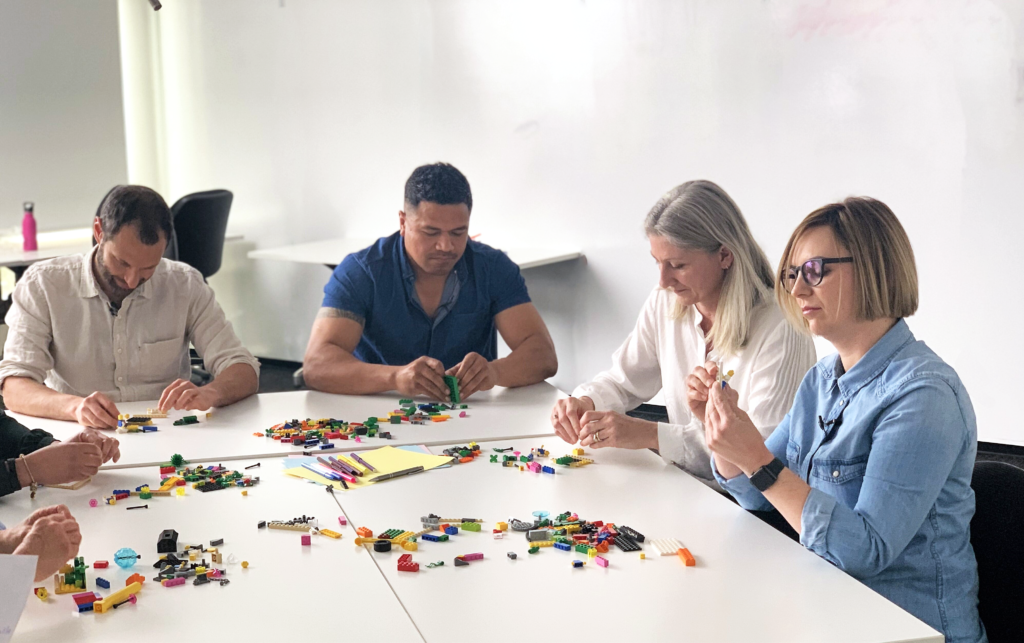Understanding the Power of the LEGO® Serious Play® Method
The LEGO® Serious Play® Method is an innovative, hands-on methodology designed to enhance problem-solving, strategic planning, and team collaboration. Many organizations have embraced this method as a means to unlock creativity, improve communication, and align teams toward common goals. However, measuring its effectiveness in achieving organizational objectives can be challenging. This article explores the key methodologies and metrics for assessing the impact of LEGO® Serious Play® Method workshops in a playful environment while addressing complex issues.
For more information on why the LEGO® Serious Play® Method is effective, check out our comprehensive training guide or learn about our certification process.
The Science Behind the LEGO® Serious Play® Method

The LEGO® Serious Play® Method is rooted in three key learning and psychological theories:
- Constructionism (Papert, 1980s): Suggests that learning happens more effectively when people create tangible models.
- Flow Theory (Csikszentmihalyi, 1990s): Participants engage deeply in creative problem-solving when fully immersed in an activity.
- Metaphorical Thinking (Lakoff & Johnson, 1980s): Using metaphors enhances understanding and enables deeper reflection on complex ideas.
These theories provide a foundation for evaluating LEGO® Serious Play® Method outcomes by focusing on engagement, creativity, and problem-solving effectiveness. For a deeper understanding, read the science behind LEGO® Serious Play® document. John Wiley & Sons has published extensive research on these methods, validating their effectiveness in deep learning and experiential learning settings.
The Essential Methods for Measuring LEGO® Serious Play® Success
To measure the success of a LEGO® Serious Play® Method workshop, organizations should adopt a combination of qualitative and quantitative assessment methods.
1. Pre- and Post-Workshop Surveys

Purpose: Assess participant perceptions of learning, engagement, and alignment before and after the session.
Metrics:
- Understanding of key themes and learning outcomes (Likert scale: 1-5)
- Confidence in applying workshop insights
- Perceived impact on teamwork and problem-solving
2. Observational Analysis
Purpose: Track participant engagement, collaboration, and contributions during the session.
Metrics:
- Level of participation per individual/team
- Frequency and depth of discussions
- Number of iterations in model-building
Observation techniques used in Occupational Health and Safety inspections, classroom environment analysis, and the observation of accident investigations can provide valuable insights into participant behavior.
3. Structured Debrief Sessions
Purpose: Capture insights, key takeaways, and personal reflections.
Metrics:
- Alignment of workshop outcomes with organizational objectives
- Key learning moments identified by participants
- Areas for future application
4. Follow-Up Interviews (1-3 Months Later)
Purpose: Assess long-term retention and application of insights gained during the workshop.
Metrics:
- Changes in team dynamics and communication
- Integration of LEGO® Serious Play® Method outcomes into strategic planning
- Tangible improvements in problem-solving processes
Follow-up assessments often integrate a questionnaire of observation to assess continued impact.
5. Business Impact Analysis
Purpose: Link LEGO® Serious Play® Method insights to measurable business improvements.
Metrics:
- Productivity changes (pre- vs. post-workshop performance)
- Innovation metrics (number of new ideas implemented)
- Decision-making efficiency improvements
Marketing students, medical students, and industrial branch engineering professionals have benefited from these insights in sectors like the Canadian Engineering Education Association.
The Key Metrics That Define LEGO® Serious Play® Success

1. Engagement and Participation Levels
Measuring engagement in a LEGO® Serious Play® Method workshop involves analyzing how actively participants contribute to discussions and model-building exercises. The number of questions asked and the energy levels throughout the session can be excellent indicators of a high level of engagement. Observation of safety inspections in workplace environments has shown that engaged employees tend to communicate better and participate more effectively in team activities.
2. Enhanced Team Collaboration
Team collaboration is a critical outcome of the LEGO® Serious Play® Method. By observing the improvement in team alignment scores, facilitators can determine how well the workshop has enhanced cohesion and trust among team members. Open dialogue and idea-sharing are key themes that help mitigate potential conflict, ensuring that all voices are heard and valued.
3. Creativity and Problem-Solving Enhancements
Creativity is at the heart of the LEGO® Serious Play® Method. The number and quality of innovative solutions proposed during a session demonstrate the workshop’s effectiveness. Incorporating physical activity and icebreaker activities can stimulate exploration of ideas, fostering an environment conducive to deep learning. Experiential learning methodologies also enhance participants’ ability to think critically and solve complex issues.
4. Organizational Integration and Adoption
One of the most significant measures of success is whether the insights from the workshop are integrated into business strategies and day-to-day operations. Adoption of LEGO® Serious Play® Method techniques in future planning sessions indicates the long-term effectiveness of the methodology. Institutions like Bournemouth University emphasize the importance of lifelong learning and structured assessment strategies in official university degrees.
How to Ensure Continuous Improvement in LEGO® Serious Play® Workshops
Refining Workshop Design
To continuously improve your LEGO® Serious Play® Method workshops, utilize iterative feedback loops. Gather insights from post-session reports and leverage them for future enhancements.
Encouraging Long-Term Adoption
Workshops should not be a one-time event. Encourage participants to integrate their learnings into daily operations and strategic planning.
Using Technology for Impact Measurement
Leverage digital tools to track workshop effectiveness over time. Use analytics to measure engagement, collaboration, and business outcomes.
Bournemouth University research highlights the role of structured assessments in lifelong learning and school transition processes.
Conclusion: Transform Your Organization with LEGO® Serious Play® Method

Assessing the impact of LEGO® Serious Play® Method workshops requires a structured approach combining qualitative feedback, observational data, and business performance metrics. By employing pre- and post-assessment surveys, structured debriefs, follow-up interviews, and business impact analysis, organizations can ensure that the LEGO® Serious Play® Method delivers tangible benefits aligned with strategic objectives.
